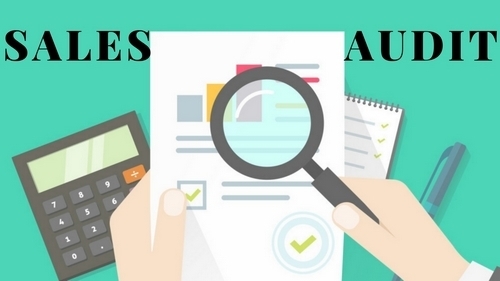While the Sales Audit may sound a complex term, it is actually quite simple. It is usually performed by an external auditor with both Sales and Marketing teams and analyzes the components that make up the sale.
It is very important that both Sales and Marketing teams need to be there for the audit since both divisions are closely knit and the interpersonal relationship and dependency of each division is what brings in the business.
Table of Contents
4 Main Steps in Sales Audit :
1) Manpower audit :
Sales Auditor may check and scrutinize the hiring methodologies of sales reps used by the company. A complete record of the Salesperson is checked including, background, references, method of selection, salary, increase or decrease in training programs for the Sales team and any other component which may be important.
2) Market Audit :
Market conditions are evaluated by the auditors to determine whether the targets given to employees are feasible or not and they are compared with market standards and industry growth rate. This helps to not only determine the feasibility of sales targets but also helps to determine early bird advantage if any for the company.
3) Sales procedures :
The auditor then goes on to check Sales procedures employed by the company including the price, discounts, promotion offers, special offers and ultimately the net profit margin. This is an elaborate step and requires a detailed analysis by the auditor. The auditor compares ideal sales procedures vis-à-vis the actual procedures carried out.
4) Customer service evaluation :
Since the retention of customer and repurchase of product or service solely depends on customer service and after-sales service, Sales Auditor performs a check on them. Also, a genuine customer feedback is obtained from the Customer service which can be passed on to the respective teams.
Thus, the sales audit involves detailed analysis of the sales procedure starting from the sales objectives set up till the ultimate sales done by the company’s sales staff, methods used to achieve the sales figures and viability and future of the trend if carried forward along with suggestions and improvements if any.
Tips for Sales Audit :
1) Sales Objectives :
Each sale should a clearly pre-defined objective like increasing the Sales from 10% to 16% this year or increased customer acquisition.
2) Policies :
The internal and external organizational policies are to be followed for the performed Sales.
3) Sales team :
If the Sales team is under or overstaffed. The distribution and achievement of the target are done properly or not.
4) Sales Methods :
Whether or not the methods employed to achieve Sales are within the limits of the organization and do they cross the ethical lines.
Advantages of Sales Audit :
1) Maximizing profits :
Effective Sales Audit will not only find loopholes but also find opportunities unexplored for the Sales of the company, thereby maximizing Sales and increasing the profit levels.
2) Budgeting :
Auditing helps in Sales budgeting for the subsequent period for the organization since budgeting involves all the processes involved in Sales Audit.
3) Reputation :
A Sales Audit which is effective will provide transparent data to the organization as well as the shareholders, thereby maintaining the reputation amongst the external stakeholders and also growing it consistently.
4) Capital Market :
Standard audit reports are accepted by all major banks and public authorities. Thus a standardization is maintained as well as the company makes a name in the capital market for itself. The organization has to remain under the guidelines of the capital market for which the Sales Audit reports are useful.
5) Lower Capital Cost :
By performing regular and timely auditing, the organization can issue clear and error-free financial statements for the public. The errors avoided today can save billions for the organization in later years thereby reducing capital cost.
6) Fraud :
Sales audit can spot and stop Sales Fraud, unethical behavior selling if any and prevent tarnishing of the company’s reputation in the market.
7) Operational improvisations :
Since Sales Auditors are involved in revenue generation of the company in almost every step, they can effectively guide – better than the Marketing team – to improve the operations thereby improving efficiency.
8) Business Value :
Sales Auditing helps in developing the value of the business. A moderate-sized business with a moderate turnover with clear Sales audit reports will always earn value than a huge multinational with unclear Audit reports.
9) Dispute Settlement :
Audit reports can always be used to settle dispute claims of past accounts. Maintenance of past accounts can be cumbersome and auditing them on urgent basis can be even more problematic. In such cases, if the company has followed the protocol of regular auditing, time and money can be saved.
10) Ethical behavior :
Sales Audit reports are crucial in taxation, for shareholders, for legal bodies and for company’s own record keeping and analysis. Regular auditing can help create goodwill of the company in the market and ethical values are incorporated in employees which are carried wherever they move with them. The company is considered a benchmark for other industries.
Disadvantages of Sales Audit :
1) Cost :
The Sales Audit involves dealing with Sales and Marketing departments and its heads, and also sometimes with every team member to go over specific details of a particular sale. This can be tedious on account of Auditor and at times the auditor may also have to go to other departments for clarifications. This involves a lot of cost on the company’s account.
2) Staff harassment :
Since numerous employees are involved in Sales Auditing, there is a chance that some of them may feel harassed and unnecessarily bothered with time and time again. This can lead to conflicts.
3) Chances of Fraud :
Since the information of Audit report can make or break a company’s reputation, auditors are often made to commit fraud in reports. Internal fraud can be beneficial for the company in the short run but in long run, it can damage company reputation.
4) Manipulation :
Audit reports are often based on the data presented by the company, and many times, the reports may be manipulated thus the audit reports themselves may be fake. This is a major concern of Sales Auditing.
Auditing starts at the micro level. Self-auditing as a person would improve us even at a personal level and in turn the company at the macro level. Sales Auditing would be similar to Self-auditing.
KPMG, Deloitte, Ernst & Young, Oracle, Aptos are some of the big names of Sales Auditors.
Liked this post? Check out the complete series on Sales

